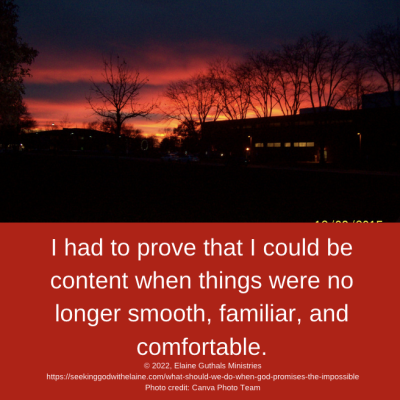God told Abraham he was going to give all Abraham could see to his descendants (Gen. 13: 14). Only problem was Abraham didn’t even have one son. This daily devotional looks at having faith in God’s promises when major changes need to take place before they can happen.
Nuggets
- Abraham was in that situation where he was looking at the impossible.
- Abraham reminded God that there was a major problem.

God will use the Holy Spirit to make His promises known to us. There are times, though, when we look at the promise and look at our situation and say, “How in the world is A going to get to B?”
Abraham’s Deal
"After these events, the word of the Lord came to Abram in a vision: Do not be afraid, Abram. I am your shield; your reward will be very great. But Abram said, 'Lord God, what can you give me, since I am childless and the heir of my house is Eliezer of Damascus?'" (Gen. 15: 1-2 CSB)
Abraham was in that situation where he was looking at the impossible.
Abraham had felt God’s call to move to a totally different land. After getting set up in the new country, God came to him several times with a covenant promise (Gen. 12: 1-3; 13: 14-17; 15: 1-21; 17: 1-27; 18: 9-15).
To read a related devotion, click the button below.
Glossary
The time that we are focusing on in this devotion is the middle visit. God promises a major reward. He is making connections with the two previous discussions of the promise.
But Abraham was also looking to the future. Yes, I am sure he would enjoy the reward in his lifetime, but he was thinking legacy.
Problem Here
Abraham reminded God that there was a major problem.
The person who was Abraham’s heir was a slave. And he and his wife were old, so it wasn’t looking good for them to be hearing the pitter patter of little feet.
Only Abraham wasn’t just saying, “I don’t have a son.” He was saying, “I can’t take my eyes off of today’s problems, so they are blocking the view of tomorrow.”
We know God lets us question to make sure it is really Him (aka Gideon) and how is this humanly possible (aka Mary). We just know that we have to question in belief (aka, I just want to make sure I am not being tempted; and I know it is Godly possible but give me a little guidance here).
To read a related devotion, click the button below.

Making the Connections
But usually, when things get hairy, we get tunnel vision. All we can see are the problems we are experiencing right now. We don’t remember God’s promises for tomorrow. We just see all of today’s headaches.
Then we don’t question in belief. We question in panic and desperation.
Even when we question, we have to be content where we are. Paul wrote, “I am not saying this because I am in need, for I have learned to be content whatever the circumstances’ (Phil. 4:11 NIV).
If we aren’t content with what He has given us, why should He give us something “bigger” and “better”?
We shouldn’t rail against God about Him working on His time schedule instead of ours. He has a plan for each of our lives, and if we are kicking and screaming on what is happening in our plan, how does that tell Him we think His plan is best?
My spiritual tornado went a long way in showing me how to be content where I was. It was easy when I had been where I thought I was supposed to be. I had to prove that I could be content when things were no longer smooth, familiar, and comfortable.

How Do We Apply This?
Abraham was always building altars (Gen. 12: 7, 8; 13: 18). Two of the three times were when God had repeated His promise. These altars were built before Abraham brought up the heir issue. He wanted to tell God that he couldn’t see past today – but God could, and Abraham had faith in the God of tomorrow.
We can’t be so wrapped up in the tunnel vision that we forget to praise. Yes, God calls us to praise Him in the trials. God calls us to praise Him continually. He calls us to contentment and worship.
To read a related devotion, click the button below.
Our tunnel vision sees something that is totally impossible. We have to take our eyes off ourselves to remember what Jesus said. “… ‘With man this is impossible, but with God all things are possible’” (Mt. 19: 26 NIV).
Let’s look at the altar and the sacrifice. The altar was made of stones changed by earthquakes, water and lightening.
How are our characters built? Through easy times when we’re going along as happy as a lark? No, our characters are built through the trials we endure.
Abraham took the stones and built an altar to worship God. We can take our trials, our hard times, our “I can only see today” times, and know that God is making us into what He wants us to be. Those experiences and lessons learned from them will be used in future service to Him.
After the altar was built, Abraham poured blood on it and sacrificed food. Isn’t it wonderful that we have Someone to whom to go and pour out our hearts! God is waiting for us, waiting to listen to our fears, our doubts, and our hurts.

But it doesn’t stop there. We can lay ourselves on the altar and have God pour His righteousness back in. We can get immediate rewards from our sacrifice and worship.
But remember, as soon as the sacrifice is made, vultures begin to circle the altar. Isn’t that like Satan? He is a vulture, coming to tear down our relationship with God — coming to play on our fears, our doubts, our hurts.
The best part — through it all, Abraham “… believed the Lord, and he credited it to him as righteousness. (Gen. 15: 6 NIV).
Abraham may have said, “Excuse me, there is one slight problem.” But he built the altars; he made the sacrifices. He couldn’t see past today, but he put his faith in God, Who could.
We have that exact same opportunity. We can believe in the God of the impossible.
God of today and God of tomorrow. We bury ourselves in the problems of today. We hear what You tell us, but we can’t see how You will bring Your promises about. Lord, we know that You can see tomorrow and can accomplish what You say You will do. We put our faith in You. Amen.
What do you think?
Leave me a comment below (about this or anything else) or head over to my Facebook group for some interactive discussion.
If you don’t understand something and would like further clarification, please contact me.
If you have not signed up for the email daily or weekly providing the link to the devotions and the newsletter, do so below.
If God has used this devotion to speak with you, consider sharing it on social media.
Pingback: Is the Old or New Covenant Better? – Seeking God with Elaine